Gurugram: The air itself seems laced with chocolate, rich and tempting, inside the pristine kitchen. Twenty-five trainee chefs, in groups of three or four, are hard at work, tempering chocolate with scientific precision, spinning sugar into fragile art, and perfecting pralines under the sharp eye of Chef Anil Rohira.
It’s all part of his two-day corporate patisserie training programme at the School of European Pastry and Culinary Arts in Gurugram, a new branch of the Mumbai-based institution.
“From not knowing what zest is to now making pralines, my journey with SEP has been out of the world,” said Varun, a trainee chef who has also previously done a six-month baking course from the acclaimed SEP in Mumbai. Many of his peers are from the Oberoi Centre of Learning and Development (OCLD), all here to polish their confectionery skills.
The Gurugram branch is SEP’s latest push to give Indian patissiers world-class training. It’s slated to have its official opening in March, but masterclasses, demos, and hobby workshops are already underway.
Its director Chef Parvinder Bali claims he didn’t need even a full minute to decide to work here. It took him “30 seconds” to pack up as the corporate chef (L&D) of OCLD and join here.
Founded in 2018 by MRK Foods owner Dhiraj Dhama, Chef Anil Rohira, and Chef Vikas Bagul, SEP doesn’t just train budding chefs but also aims to revolutionise India’s culinary education landscape.
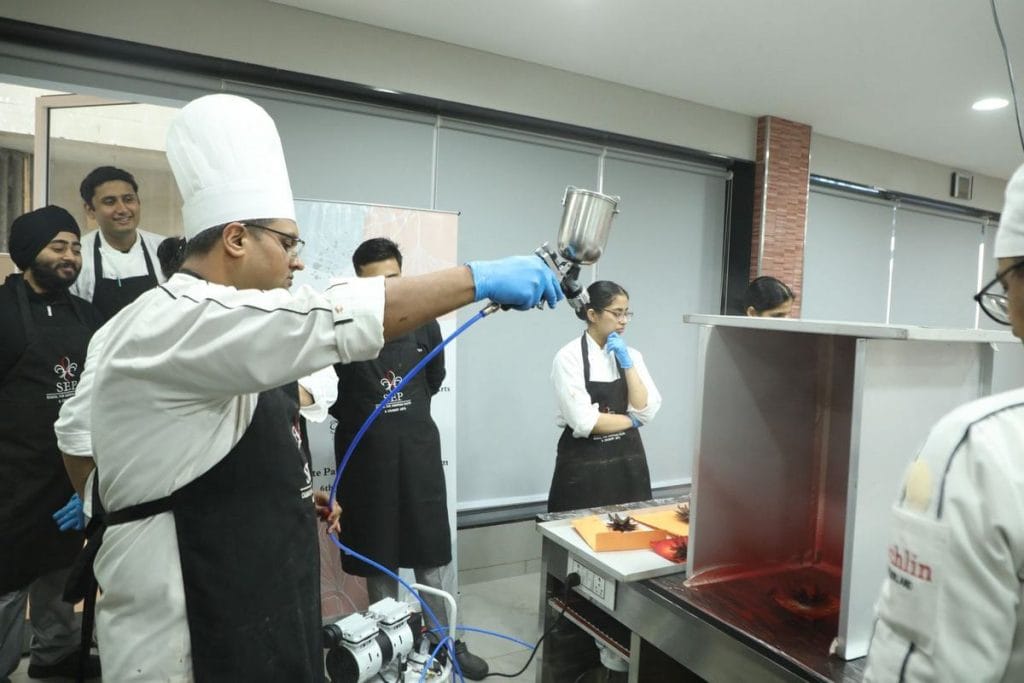
“SEP is at par with international standards and pastry schools. I picked it over culinary schools in France,” said Sufiyaan Habeeb, a sous-chef at SEP Gurugram. He has completed a six-week certificate course in egg-free baking and pastry, followed by a diploma course in professional baking and pastry at the Mumbai branch.
India’s culinary school scene is a niche domain with only a handful of prominent players such as Symbiosis School of Culinary Arts, Indian Institute of Hotel Management and Culinary Arts (IIHMCA), Institute of Hotel Management (Taj Group), and the Oberoi Centre of Learning and Development. Many aspiring chefs still flock abroad to pursue their culinary or pastry degrees. So, why isn’t India taking the cake?
The cracks are hard to ignore. Outdated infrastructure and a huge shortage of trained educators have left the Indian culinary education system trailing far behind its European and British counterparts. Now, SEP is on a mission to bridge the gap.
With two branches in Mumbai and one in Gurugram, the school caters to students aged 16 to 70. Famous for its pastry and baking courses, the Gurugram branch is spread across four floors with a total carpet area of 20,000 square feet. And it ups the ante with a new culinary arts division. They offer an array of programs, often tailor-made. Even industry giants like Taj and Oberoi send their chefs for training here.
“State-of-the-art equipment is expensive. Real estate is expensive. And, that is when people start cutting corners saying: ‘khana banana hi toh sikhana hai (we just have to teach them how to cook),” Bali said. “Now, we will be creating a benchmark for the culinary institutes to wake up, smell the coffee, and change their way of looking at things.”
Also Read: Korean BBQ is an old fad. There’s a Turkish takeover in Delhi’s food scene
Equipment wonderland
Chef Bali walks up to a sleek, tall oven and flips a switch. Then, instead of
fiddling with knobs or manual settings, he opens an app on his iPhone, taps a few options, and the oven springs into action. Moments later, it initiates a self-cleaning cycle.
“This beauty is straight out of Germany,” he said, gazing fondly at the multipurpose machine—an iCombi oven that can steam rice, grill and roast meats, and, of course, bake. It can be operated from any corner of the world via an iPhone application.
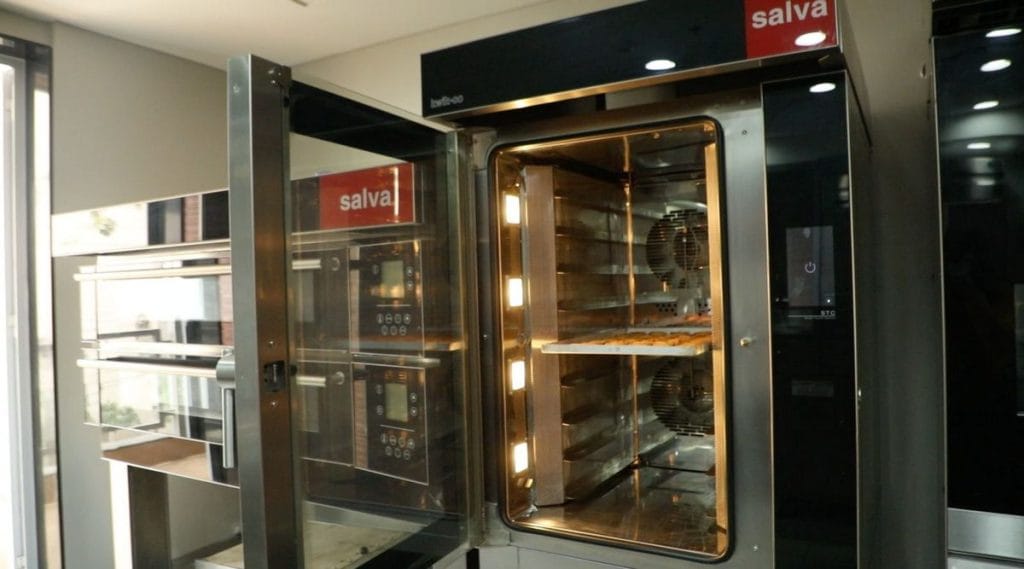
And it has plenty of other impressive gizmos to keep it company in this kitchen. These include a buffalo chopper, a powerful device for quickly shredding or chopping large quantities of food, and a three-part oven priced at around Rs 1 crore. It combines a proofing cabinet for fermenting dough, a convection oven, and a deck oven that’s ideal for artisanal breads and pizzas.
The SEP kitchen isn’t just a cooking space—it’s a wonderland of cutting-edge culinary gadgets that would make even a seasoned chef’s eyes light up.
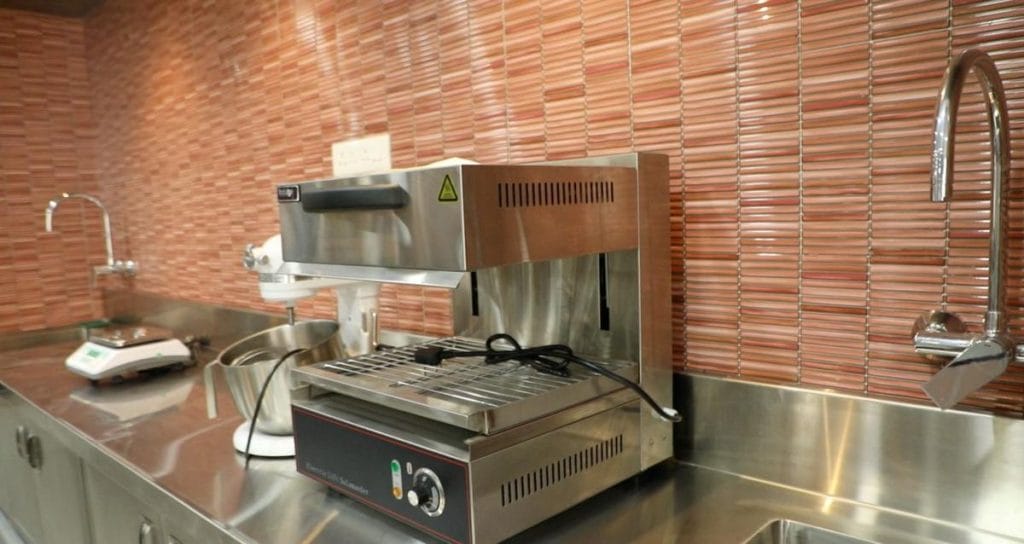
“We want our students to step into any professional kitchen, whether in India or abroad, and feel right at home,” said Bali, who has over 30 years of teaching experience.
Even some of India’s 5-star hotels and top restaurants lack this level of equipment, according to Chef Ashish Bhasin, who recently taught a demo class at SEP Gurugram.
“They are at par with global standards,” said Bhasin who taught a group of around 20 students how to cook steamed Camembert soufflé with paprika beurre blanc a month ago.
But state-of-the-art equipment is only part of the SEP’s recipe for success. Premium-quality ingredients and world-class culinary educators are equally essential—and both depend on each other.
The luxury ingredients conundrum
European chocolates, three varieties of asparagus, rare spices—SEP’s pantry is stuffed with imported delights. This is no surprise, considering that co-founder Dhama’s MRK Foods is one of India’s largest importers of food ingredients.
But these ‘exotic’ ingredients come with a challenge—most Indian chefs don’t know how to cook with them
“Cooking is a lot like science,” said Dhama. “You need to know the precise moment to add pasta to boiling water, how long to cook it, and whether to serve the sauce on top or toss it together—like we often do in India. After all, brands expect chefs to cook it right, and serve it right.”
India’s culinary schools, however, often focus on mass-market cooking rather than fine dining because that’s where the demand lies, according to Parth Gupta, founder and head chef of Bloom in Delhi’s Khan Market.
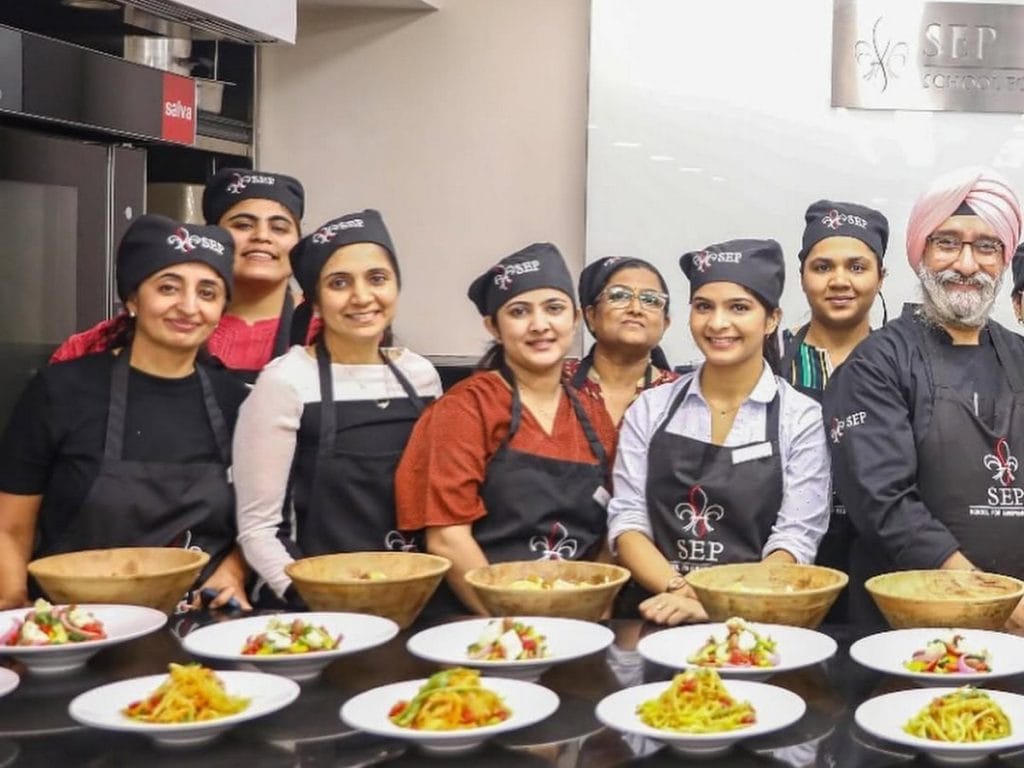
“Spending Rs 500 per head in a restaurant is considered a good deal by Indians,” said Gupta. “The majority of restaurants price their products accordingly—and so they use ingredients that can maintain this price point and make profits.”
Indian culinary education is tailored to meet these market norms, but for chefs who hope to master luxury cooking, there are limited options.
“If I want to tap into the premium side of the food sector in India, I have to first go abroad and learn how to use high-quality equipment and ingredients,” added Gupta, who earned a diploma from Ecole Ducasse in Paris, followed by a stint at Le Cordon Bleu and the Michelin-starred Club Gascon in London.
Best of the chefs
As the 25 trainee chefs walked into the display room at the Udyog Vihar SEP facility with their edible masterpieces—raspberry bon bons, salted caramel pralines, Dubai kunafa chocolates—their excitement was palpable. As they clicked pictures and recorded videos with their creations, Chef Rohira beamed with pride from his vantage point in a corner of the room.
“Our USP is the knowledge base we form by learning from chefs across the country and around the world, and passing it on to our students,” said Rohira. “They stay at the top of trends, ingredients, techniques, and more.”
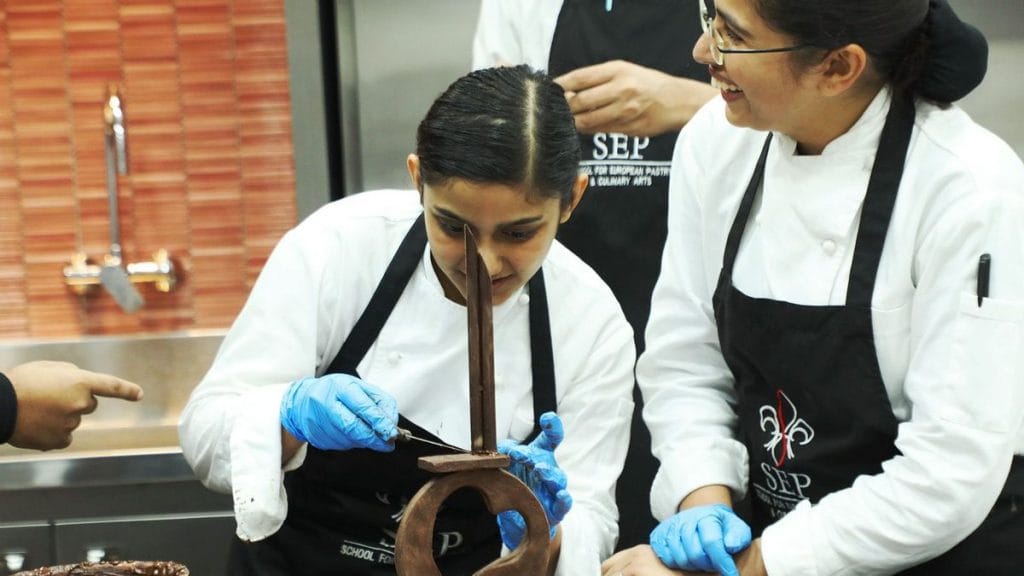
“Forget the young batch,” Chef Bhasin said with a laugh. “I have nearly three decades of experience but if given a chance, even I wouldn’t miss training under this trio (chefs Rohira, Bagul, and Bali). They are icons of their respective fields.”
For aspiring chefs, training abroad has long been the gold standard. The hefty sums they pay are in exchange for exposure and expert mentorship—something domestic institutions have generally struggled to deliver. Yet, SEP is changing that perception.
Chef Sufiyaan Habeeb, for instance, planned to go to France after completing his education in the USA. But in 2019, during a vacation in India, his grandmother introduced him to SEP Mumbai.
“I just wanted to pursue a short-term (six-week) course before heading to France,” he said, but ended up working there instead. Four-and-a-half years later, he is a sous-chef at SEP Gurugram.
Habeeb credits his growth and journey to SEP’s leadership.
“They are exceptional—world-renowned experts who bring so much knowledge and passion into their teaching. On top of that, we regularly host master classes with leading chefs from around the world, giving students invaluable global exposure,” he said.
Dhama added that the Gurugram branch is already planning to host culinary legends such as chefs Vikas Khanna and Kunal Kapoor in the coming months.
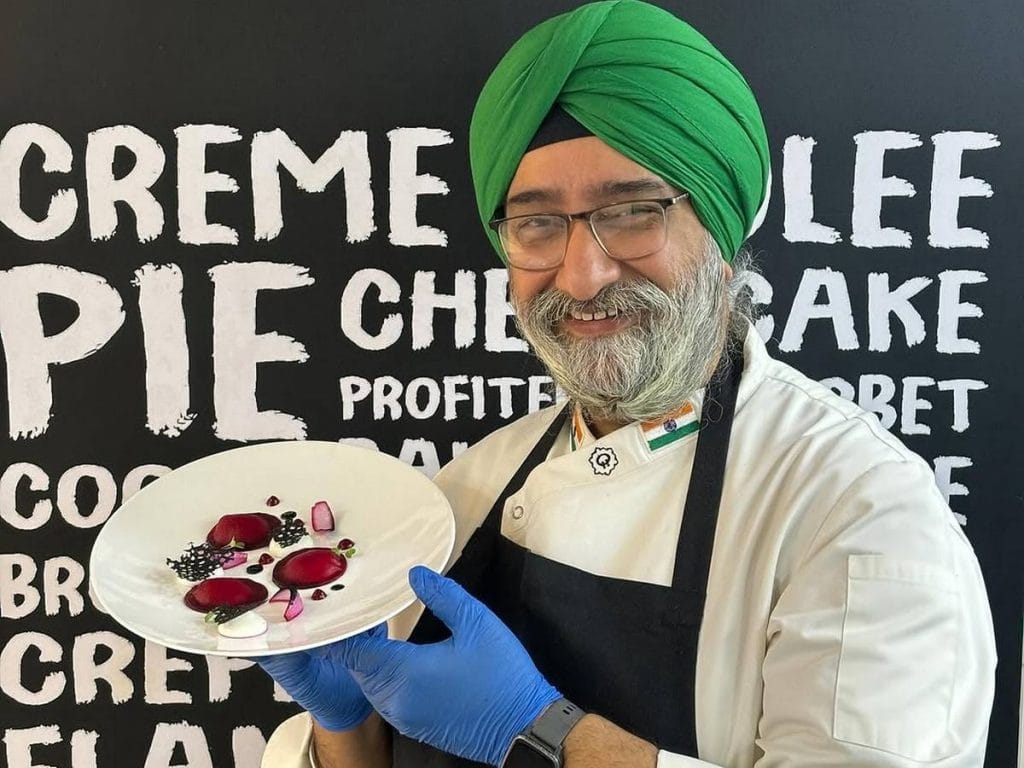
The shortage of culinary educators, however, is still a major obstacle for India’s culinary schools. While there is no dearth of talented chefs in the country, teaching requires more than just industry expertise.
“I might be awesome at performing surgeries but it is not necessary that I will be able to teach medical students how to perform one,” said Bali. “Many Indian chefs can cook for a banquet of 1,000 people but stumble when it comes to showing a classroom how to pull off the same magic.”
Also Read: Delhi’s Majnu Ka Tila has an Italian connection. First of its kind beer gelato in NCR
Degrees, certificates, and dough
Enrolling at institutions like the Indian Institute of Hotel Management and Culinary Arts or the Taj Group’s Institute of Hotel Management ensures students a degree, placement opportunities, and often a job. In contrast, the SEP offers only a certification—a factor that makes some think twice about its value.
“It’s pricey, especially since it doesn’t provide a formal degree,” said Ramona Narang, a 34-year-old home chef from Gurugram. After years of cooking for her loved ones, Narang is ready to step up her game with professional training to launch a bakery from her home.
She discovered SEP through social media but was taken aback by the fees: a six-month bakery course costs Rs 5.75 lakh, plus 18% GST—and that’s an inaugural price.
Even personal masterclasses can be steep—learning the art of sourdough bread, for example, costs Rs 35,000-40,000, depending on how many breads a student wants to master and which SEP chef conducts the session.
For Narang, paying Rs 3.3 lakh for a three-year bachelor’s degree in Catering Technology & Culinary Arts (BCT & CA) at IIHMCA is a better value proposition.
“That’s different,” she said. “There’s a degree involved.”
But Dhama and Bali dismiss the degree-over-certification mindset as outdated.
“Chef Vikas was Southeast Asia’s pastry chef for JW Marriott. Google recognises Chef Anil as one of the top chocolatiers and he has also worked for the White House. And Chef Bali has 30 years of training chefs in India’s top culinary circles,” said Dhama. “Dismissing their training for a degree is absurd.”
Many top chefs, Dhama pointed out, don’t hold formal degrees but still excel and have a wealth of skill and experience.
“In this field, no one asks for a degree. They ask if you can do the job. SEP students will never struggle to find jobs; their training speaks for itself,” he said.
Bali offered a practical example to illustrate this point.
“Imagine my restaurant’s baker quits, and I need a replacement fast. I have two candidates—one with a bachelor’s degree and one who’s mastered sourdough breads and cakes. Who do I hire? When you can answer this question, you’ll automatically answer the certificate-versus-degree debate,” he said.
While SEP Gurugram is still completing its reception area and is yet to roll out a marketing campaign or officially open registration, students are already signing up.
The team is optimistic that the Gurugram branch will mirror the success of its Mumbai counterparts. Plans for expansion—including taking SEP to international shores—are already on the cards.
But Dhama was categorical about their primary mission: “SEP ka thapa (stamp) should guarantee you’re the right pick for the job—experienced, skilled, and trained with top-tier ingredients and equipment.”
(Edited by Asavari Singh)



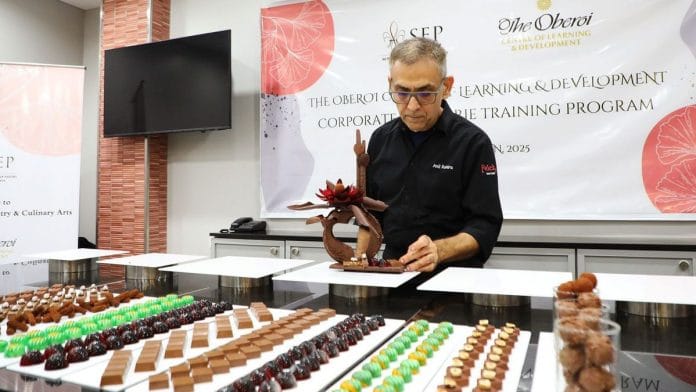



Gurugram is all money no taste.
Refinement is not something one can expect from a loud-mouthed flashy bunch of people sitting on hordes of ill-gotten wealth.
Even the creator of Gurugram, DLF and it’s infamous founder, has been embroiled in all kinds of financial wrongdoings right for the last four decades. Of course, no political party goes after him as he keeps everyone “happy”.